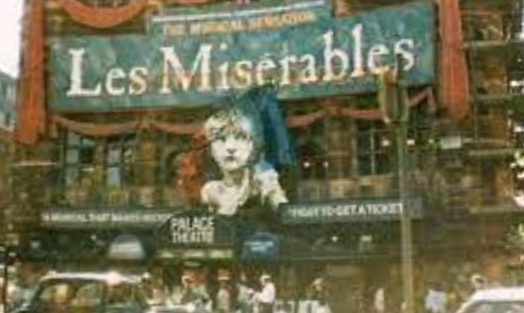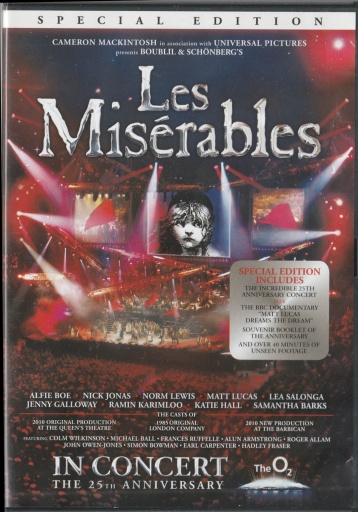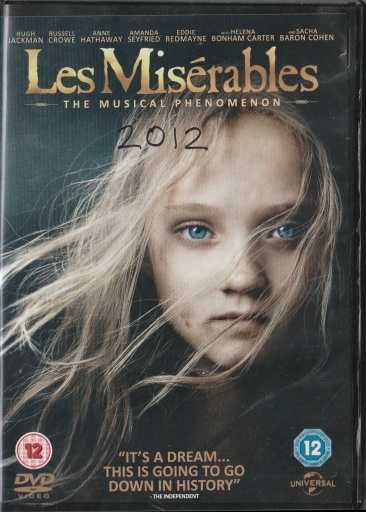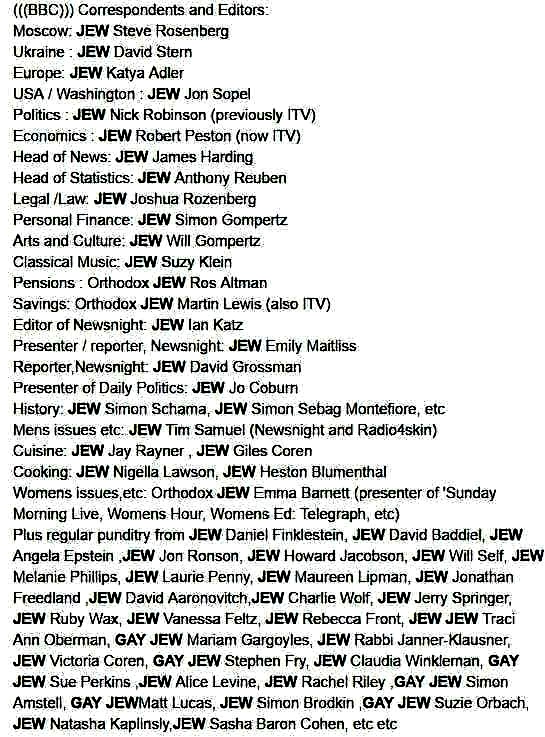 Cropped evening shot of Palace Theatre
Cropped evening shot of Palace Theatre

 Isn't the BBC neutral and honest? - No, of course it isn't
Isn't the BBC neutral and honest? - No, of course it isn'tReview of Les Misérables Stage & DVDs
Rae West - 27 September 2023
They don't, of course. That Jewish operation has succeeded since the impositions of Christianity and Islam. And in recent centuries, slave trades, the US Civil War, the 'Great War', and of course Hitler, are further important examples. Much of the repetition is by assistants and subordinates and juniors, otherwise unemployable and inferior teachers, all usually paid from their host communities.
Much of the success depends on non-repetition of embarrassing facts. Good examples come from Jewish 'education' which is kept as secret as possible. European education appears often enough in fiction and fact—Oliver Twist, To Kill a Mockingbird, Dead Poet's Society, Gibbon's Autobiography, Rousseau on education, endless US 'grade school' officious tomes. But where are criticisms or descriptions of Jewish 'education'?
- RW
Literary Preface. Victor-Marie Hugo (1802-1885). An Oxford Companion to English Literature continues: ‘French poet and novelist, the leader of the French Romantic movement. He entered political life after the Revolution of 1848 and showed himself an eloquent defender of liberty. ... He wrote a long drama Cromwell (1827) ... Hernani on the stage in 1830 was one of the principal events of the literary revolution.’ ‘His most famous novels include Notre Dame de Paris (1831) and Les Misérables (1862)’.
Note that between Hugo aged 50 and about 70 Paris was being partly rebuilt by Hausmann. Les Misérables was published amid the chaos and may have been a salute to the old Paris.
Charles Dickens (1812-1870) spanned a similar period and his novels were somewhat similar in content, but not in form.
On 'romanticism', let me quote Bertrand Russell: ‘... Cultivated people in eighteenth-century France [i.e. before the 1789 'French Revolution'-RW] greatly admired what they called la sensibilité, which meant a proneness to emotion, and more particularly to the emotion of sympathy. To be thoroughly satisfactory, the emotion must be direct and violent and quite uninformed by thought. The man of sensibility would be moved to tears by the sight of a single destitute peasant family, but would be cold to well-thought-out schemes for ameliorating the lot of peasants as a class. ...’ Russell wrote a lot more on romanticism, including dislike of Rousseau and a supposed link with 'Nazis', though he could not produce a psychological profile. My point here is that 'romanticism' is encouraged by Jews amongst goyim as a distraction from serious analysis.
(Russell mentioned Victor Hugo in War Crimes in Vietnam without understanding the Jewish influence: 'Religious revival took strange new forms, and spread throughout the countryside. Foremost among the new sects were the Hoa Hao and the Cao Dai, the latter being the more bizarre of the two. Cao Daiism combined elements of Buddhism, Christianity and Hinduism, and included Victor Hugo among its saints.)
19th Century Europe and Jews 19th-century France was increasingly permeated by Jews, just as Belloc showed in Britain at that time, in his book The Jews (about 1920). Victor Hugo fits the characteristics of Jews—vague romantic ideas such as 'liberty', avoidance of links between Jews and Roman Catholics, avoidance of tales of money controllers, avoidance of Franc-maçonnerie, support of Jewish-funded militarists such as Cromwell.
Lanson's Hachette Littérature Française (yes, I have an old copy!) says V Hugo was a poet, not a practitioner of ‘le roman’. The critics seem not too impressed with Hugo, saying among many other things that he had no original ideas. Flaubert and George Sand were officially better novelists.
Stage, Films, Video
On what were called films, but are now mostly digital videos, let's consult Halliwell's Film Guide, named for Leslie Halliwell of Bolton (1929-1989). His background is obscure; but he was either utterly unaware, or exercised strict censorship, of Jewish issues—a handicap for a serious film critic. He genuinely seemed to think the 1920s and 1930s were a golden age of cinema; an emotion derived from enjoyment of 2,000 seater cinemas and liking for outings for entire families. Halliwell was simple about economics, with little idea of cross-subsidies and company laws and the effects of bottomless pits of Jewish paper money on ‘the arts’.
Poetry seems not very compatible with film, and perhaps even less so with talkies. So we may forget most of Victor Hugo's work. However, his novels were filmable. We find a 1935 Les Misérables (including the accent) by Darryl F Zanuck, acted by the then-lauded Fredric March, Charler Laughton, and Cedric Hardwicke. Halliwell describes it: Unjustly convicted and sentenced to years in the galleys, Jan Valjean emerges to build up his life again but is hounded by a cruel and relentless police officer. And adds: It is hard to see how this film could be bettered. It was remade (about the same length) in 1952.
A handy footnote lists ten 'other versions' from 1909 to 1978. Most are French. An American version was called The Bishop's Candlesticks.
The Hunchback of Notre Dame was another V Hugo story, produced in 1939 (black/white) and 'superb', 'sheer magnificence'. With Charles Laughton and Cedric Hardwicke. I've put this in to show Hugo had some vogue in France, which spilled over into the USA film industry. As with book publishers, forever trying to repeat past successes, V Hugo repaid scrutiny.
Stage versions of Les Misérables
[Special note to non-French people: 'Les', pronounced something like 'lay', is a plural definite article, not present in official English. It's about equivalent to the first words in "them books" or "they animals". 'These' and 'those' are too specific to be equivalent]
The 25th anniversary of Les Mis was staged in the O2 arena—the so-called 'Millennium Dome' in London, the heavy architectural version of a huge tent paid for by borrowing from the usual. The event was videod discreetly. Both it and the companion DVD are in the standard Jewish mode of 'positive' and 'feel good' scenes. In the artificial world of Jewish controlled media, there's usually an amusing contrast between the presentations of the "luvvies", all of them aware that a discordant note might precipitate the rage of the other luvvies on their heads; and their products, always heavy with conflict and argument, rage and violence, perversions and unconcealed lies.
From the DVDs' helpful little leaflet, we are told that 1985 had the first Barbican performance, followed by the Palace Theatre, the latter in a corner site in London with its pic of a sad little girl. Most of these theatres have a two centuries or more of history.
Cameron Mackintosh gets two pages at the start, split with bold headings—SWEEPING MASTERPIECE, RECORD-BREAKING, WORLD WIDE SUCCESS. This echoes much of the second bonus DVD, mostly a BBC film of training for the event. It's dated MMX and appears to have been broadcast after the event.
We have his account of the first night at the Barbican—which is a heftily-concreted mostly residential secure site, with cultural trimmings, near the City on London. There was an unprecedented rush for tickets. Or so the story went; being sceptical I doubt this, and suspect there was a moneyed claque. Probably the later Susan Boyle song was rigged too; obviously she'd have been auditioned, and mulled over. But probably all this is standard enough.
We have one page from Alain Boublil and Claude-Michel Schönberg, I'd guess two French Jews, taken into the UK impresario circuit, including Trevor Nunn. I can't help wondering if Andrew Lloyds-Bank (as Lloyd-Webber was wittily known) had some contact.
Boublil and Schönberg are shown as rather hopeless optimists, sending out their composition in vain to unreceptive non-responders. In fact, as we've seen, the story had been repeatedly filmed and could have been examined by anyone clued up on film history. They were said to have been inspired by Lionel Bart (in fact, Lionel Begleiter) whose Oliver came out in 1960. Boublil seems to have had the skill and sense to retain the copyright.
Pop music has short professional videos, and long less professional ones. I can remember a film about Marc Bolan, and one attributed to Pink Floyd, and Jackson's Beatles film.
In 1965 Rodgers & Hammerstein's Sound of Music was allegedly popular, and had its a propagandist function as part of the victory celebrations of Jews in World War 2. So did South Pacific which started on stage 1949.
1971 Jesus Christ Superstar also has a message, based on Judaic mythology—embedded for about 1500 years now.
1989: Boublil and Schönberg collaborated on Miss Saigon, also of course with a political message on Americans, and the French, and Vietnamese prostitutes. This seems tangential to Les Mis; but who knows—both their composing and wordsmithing seem suspect; perhaps they were from in fact the world of presentation.
2008 was Mamma Mia's first film, with stage shows all over the place. Perhaps there no love lost between the various producers and 'angels'.
It looks likely that muted messages are significant in the production and distribution of these things.
Words, or 'Lyrics' Words to be sung are not the same as scripts, or poems, so lets stick to 'lyrics'. Anyway, Herbert Kretzmer gets his page in the booklet, with quite a few words but little detail, as becomes the field of vague undetailed romanticism, of "dreams", of "poverty" as a cause, and "freedom" and 'liberty' are undescribed wonders. There seems to have been at least another English-language lyricist, not much mentioned.
"I dreamed a dream in time gone by | When hope was high and life worth living | I dreamed that love would never die | I dreamed that God would be forgiving" is a good example of sublimated trivia; or is it? John Lennon, who should know, praised the spare words of one of his songs at the same time as an M.P. was ridiculing it.
The next page is Alfie Boe, surely not a real name. Shown belting out his songs in DVD #2. Assuming he's near the maximum volume possible for singing in tune, the arena is so large that he needs amplification, which seems a bit sad. Crooning would be easier, but doesn't fit into the play's persona, with mass shouting substituting for emotion.
BBC Promo The 2010 DVD part 2 'bonus disc' includes what is presumably the whole of a BBC TV film, about 1 hour, a BBC / Cameron Mackintosh Co-Production. With half a dozen behind the scenes shorts. It obviously post-dates the O2 event. There's some fascination in seeing small sections of publicity and rehearsals and the way the staging and selections are organised. The 'sitzprobe', their version of a walkthrough and rehearsal, where the orchestra is called 'a band', was quite touching in its top-down power manipulation of youngsters, many of them on some version of a treadmill to nowhere.
Matthew Lucas (Lukacs?), "one of the better French names", was being trained as the innkeeper whose name I forget. The less good ones weren't named. Everybody was on good-natured terms. His somewhat oompahed song was clearly regarded as a relief from the long solemn arias. It amazes me that they seemed unable to find another. And it amazes me that audiences could wildly applaud such an unconvincing bit of story—pickpockets, crap food, respectable clients.
The Plot is Ridiculous with reinforcing strands of absurdity. [Caution: I haven't read V Hugo's book which in any case must be difficult to translate. So it's possible the plot is perfect and cogent.]
One is the 1848 revolution stuff which V Hugo lived through or away from. The best introductions to 1848 known to me are in Miles Mathis, such as this:–
Another is the attention paid to tiny groups of people; the title could be La misérable for all the difference it would make. As with Oliver Twist, one character is saved or enriched, and the rest ignored. Psychologically it works better than might be expected, since the simpler consumer identifies with just the central character. Mass psychology is a more difficult subject. But it conforms to Russell's 'man of sensibilité'.
The prostitution scenes (Kretzmer omits the great part played by Jews in prostitution and child abuse—sex being allowed with girls aged 3 plus a day, but no doubt V Hugo omitted it too) have the usual forbidden fruit titillation.
And another problem is absurdities: galley slaves were outdated. Would stealing bread really get ten years or whatever?—in England, many were exported to populate places like Australia. In any case, with tens of thousands convicted, would anyone spend his life hunting down just one? Would innkeepers get away with junk food and endless extra tips and payments and uneatable food? There are scenes of hunts through the cloaca maximus as it was supposed to exist, another Jewish preoccupation as utilised by Steven Spielberg.
Another recentish-Jew intrusion, a relic of the Coudenhove-Kalergi oddity, is the insertion of so-called blacks into videos, film, adverts, music. 'So-called' because generally they are mixed race, often enough with Jewish fathers, though this is unadvertised. France's several empires in north Africa gave them practice is training and education with unimpressive results—Gobineau recording typical opinions.
Now (written in 2023) there are even blackish 'newsreaders' on the BBC with anonymously-sourced scripts. Their minimal talent is shared by others, unfortunately: here's the BBC news on Sept 11, all of course choreographed. bbc-news-2001-sep-11maybe-edited.mp4 I don't guarantee it hasn't been altered to remove or insert material.
It's What Jews Do For people unaware of anything, may I suggest they read my review of Bjerknes' book Beware the World to Come which is the only detailed look (known to me) into long-term Jewish 'philosophy' and includes a lot of mysterious stuff, such as the love of 'Satan', which explains John Milton.
Part of the Jewish psyche, which seems so ingrained it may prove to be genetic, is the linked idea of a special 'God' who selected them, or possibly the other way around, since they have accounts of winning arguments with God!. It helps explain why they seem to be proud to be 'Jews' but keep it very secret indeed. They have a slogan, "tikkun olam", meaning something like ‘bringing the light’and which directs them to describe ways of life before Jewish victories as failures and disasters. Pagans, Romans, Egyptians, Persians, Babylonians, Russians and Chinese before 'Communism', illustrate this compunction.
In our miserable context, the Catholic Church is a significant agent. It is of course dependant from early Jews, with financial links which are kept hidden, and a psy-op against goyim, though of course this phrasing is never used. There's a long history of hostility between Jews and Catholics, but on examination this is mostly a fraud, called out on occasions when a bit of pretence is needed.
In Les Mis we find the characteristically Jewish implicit claims about 'revolution', dating largely from 1789. This used the complete omission of activities internationally of Jews. Walter Scott was an early writer on this subject, but his words on the subject are as hard to find as Jews being honest about 'The Holocaust'. Jew money in funding thugs and propaganda to this day is censored from Judaic publishing in all media.
Do you know why there is no mention of Harpagus conquering the Phoenicians in Herodotus? Because the Phoenicians were more relatives of the Persians by marriage. This has been mostly scrubbed, but I can re-create it for you just by studying the pathetic lies we are told by the mainstream. It is easiest to see by visiting the Wiki page for Bardiya, son of Cyrus the Great. Start at the bottom, where you will find that Gore Vidal and Jorge Luis Borges both wrote about this mystery. Why would famous Jews be writing about such obscure stuff 2,500 years later? Because this is what they do: they have to continue to misdirect century after century, or someone like me might catch on. ... ’
— from Miles Mathis, in his long essay phoenper.pdf (Mathis likes obscure filenames)
For the first time in the history of the world, these ideas are being spread and discussed. At the same time, Jews and their allies are seriously putting into action their long-term plans. The world now is mapped out in a way previously impossible, so an unspoken assumption of Jews—that a place to move to will always be available—seems to be falling. They can't all move to a tiny Hawaiian island. What will happen? I don't know.
© Rae West 27 September 2023